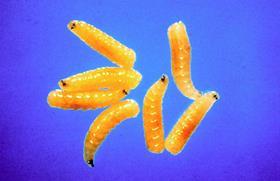
A major growing site in Tasmania (Australia's most southern state), is undertaking surveillance and control actions after a suspected Queensland fruit fly larva was found on apricots near Spreyton. The discovery was reported by a resident who found the larvae on apricots grown in their backyard.
Just a week prior, two incidents of fruit fly larva were confirmed on Flinders Island, just off the coast of Tasmania’s mainland.
The Spreyton larva has been preliminarily identified by entomologists as a species of Bactrocera fruit fly. This is a List A pest under the Plant and Quarrantine Act 1997, meaning that it is a not a pest that occurs in Tasmania.
The larva will now undergo more extensive genetic testing to confirm its identification.
Tasmania’s fruit fly free status is integral to its position as an exporter, and chief plant health manager, Andrew Bishop, told ABC News, that it was a serious situation for Tasmania.
As soon as the larva was spotted, the Tasmania fruit fly operations standard was implemented and all fruit was removed from the site. Surrounding soil will be treated, and an intensive trapping program set up within a 1.5km radius of the discovery site.
On Flinders Island, the trapping program has been monitored closely and currently no live fruit fly have been detected since the larvae were discovered.
The Examiner reported that it was still too early to tell if the two incursions were linked to one another.
Currently, the incident has no effect on the state’s fruit fly free status, however, Bishop said he had been in contact with the Commonwealth Government and domestic trade partners.
Earlier this month, fruit fly larvae were detected in Adelaide, South Australia, near the Riverland growing region, which is reliant on its fruit fly free status.
By law, it is required for persons to report any signs of fruit fly to the Biosecurity Operations Centre.



